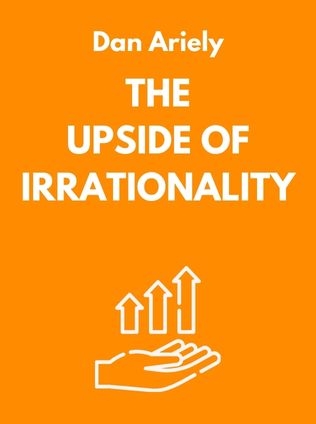
The Upside of Irrationality
The Unexpected Benefits of Defying Logic at Work and at Home
By Dan Ariely
Published 05/2011
About the Author
Dan Ariely is the James B. Duke Professor of Psychology and Behavioral Economics at Duke University, with appointments at the Fuqua School of Business, the Center for Cognitive Neuroscience, the Department of Economics, and the School of Medicine. He is the author of the New York Times bestseller Predictably Irrational. Ariely's work is distinguished by his creative and engaging experiments that reveal the often surprising ways we think and behave. In The Upside of Irrationality: The Unexpected Benefits of Defying Logic at Work and at Home, Ariely dives into the seemingly illogical aspects of human behavior to uncover their unexpected benefits.
Main Idea
In The Upside of Irrationality, Dan Ariely explores the dual nature of irrational behavior, illustrating both its positive and negative impacts on our lives. By examining our behaviors at work and in relationships, Ariely provides insights into what truly motivates us, why we value our creations so highly, and how we can learn to harness our irrational tendencies for better decision-making and improved well-being. Through a series of entertaining and thought-provoking experiments, Ariely demonstrates that understanding our irrational nature can help us navigate the complexities of modern life more effectively.
Table of Contents
- Introduction
- Paying More for Less: Why Big Bonuses Don't Always Work
- The Meaning of Labor: What Legos Can Teach Us About the Joy of Work
- The IKEA Effect: Why We Overvalue What We Make
- The Not-Invented-Here Bias: Why 'My' Ideas Are Better Than 'Yours'
- The Case of Revenge: What Makes Us Seek Justice?
- On Adaptation: Why We Get Used to Things (But Not All Things and Not Always)
- Hot or Not? Adaptation, Assortative Mating and the Beauty Market
- When a Market Fails
- On Empathy and Emotion: Why We Respond to One Person Who Needs Help But Not to Many
- The Long-Term Effects of Short-Term Emotions: Why We Shouldn't Act on Our Negative Feelings
- Lessons from Our Irrationalities: Why We Need to Test Everything
Introduction
Dan Ariely sets the stage by explaining how modern technologies often fail because they do not account for human fallibility. Behavioral economics seeks to understand our limitations and design systems that help us avoid mistakes and achieve our goals. By observing our behaviors and understanding the irrational forces that influence us, we can make better decisions both individually and as a society.
Paying More for Less: Why Big Bonuses Don't Always Work
Ariely discusses an experiment conducted with MIT students to understand the relationship between bonus size and performance. The experiment revealed that high bonuses led to better performance only in mechanical tasks, whereas for cognitive tasks, high incentives actually reduced performance. This suggests that large bonuses may not be effective for roles requiring mental effort.
"Paying people high bonuses can result in high performance when it comes to simple mechanical tasks, but the opposite can happen when you ask them to use their brains." - Dan Ariely
this phenomenon include:
- CEOs with high bonuses underperforming in decision-making roles.
- Senior vice presidents motivated by high bonuses performing poorly in strategic tasks.
Ariely’s experiments with MIT students demonstrated that for tasks requiring cognitive skills, higher incentives led to poorer performance due to the increased stress and distraction associated with the large rewards. This finding is crucial for organizations that use financial incentives as a primary motivation tool, suggesting that they might need to rethink their strategies to ensure they are fostering the right kind of motivation for complex tasks.
The implications of these findings extend beyond the workplace, affecting areas like education and personal goal-setting. For example, students who are highly incentivized with rewards for achieving high grades may find themselves underperforming due to the pressure, whereas a balanced approach that includes intrinsic motivators like interest and passion for the subject may yield better results.
The Meaning of Labor: What Legos Can Teach Us About the Joy of Work
Ariely describes an experiment involving Lego Bionicles to illustrate how the meaning we attribute to our work affects our motivation. Participants who saw their creations preserved were more motivated than those whose work was disassembled.
"The joy they derive from the activity is going to be a major driver in dictating their level of effort." - Dan Ariely
Key insights include:
- The importance of meaningful work in motivating employees.
- The negative impact of meaningless tasks on productivity.
The Lego experiment underscores the significance of meaningful work. When participants saw their Lego creations being dismantled right after completion, their motivation dropped significantly compared to those whose creations were preserved. This finding is pivotal for managers and leaders who aim to boost employee motivation. Providing meaningful tasks and recognizing employees' contributions can lead to higher job satisfaction and productivity.
Sign up for FREE and get access to 1,400+ books summaries.
You May Also Like
The Subtle Art of Not Giving a F*ck
A Counterintuitive Approach to Living a Good Life
By Mark MansonRich Dad Poor Dad
What the Rich Teach Their Kids About Money - That the Poor and Middle Class Do Not!
By Robert T. KiyosakiHow To Win Friends and Influence People
The All-Time Classic Manual Of People Skills
By Dale CarnegieFreakonomics
A Rogue Economist Explores the Hidden Side of Everything
By Steven D. Levitt and Stephen J. Dubner



















